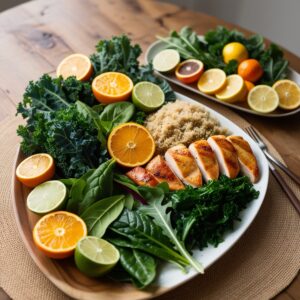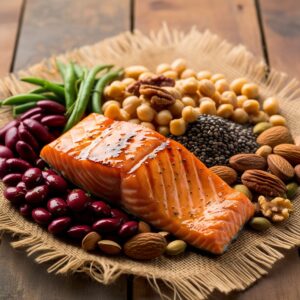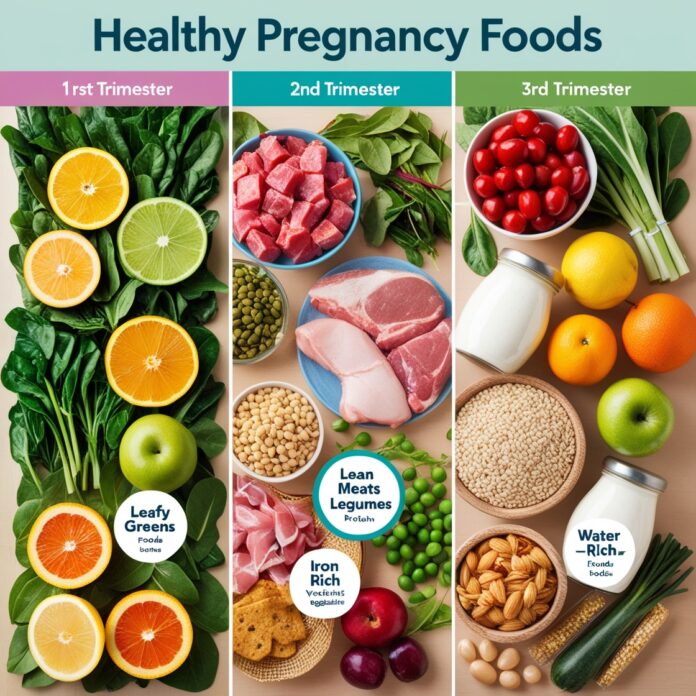The words here are from a major source of change in the life of a woman. During the child’s gestation period the most critical factor to keep the health of both the mother and the baby is a balanced diet. Consuming healthy food can be both sufficient and safe during pregnancy for a couple of reasons. However, a few of the foods present can be harmful during pregnancy, so it is very important to know which foods to eat and the ones to avoid in the different trimesters.

Trimester 1: First Semester (Weeks 1-12)
Your baby’s organs are being formed during the first three months, therefore, it is wise to go for the foods that speed up the growth of both the baby’s and your bodies, and stay away from what is not really good for you and your child.
Foods Safe to Eat in the First Trimester:

- Green Leafs and Vegetables: Spinach, broccoli, and kale are high in folate, which can protect your child from neural tube defects
- Wholegrains: Oats, brown rice, and whole wheat are a great source of roughage, which can prevent from constipation, and maintain the health of the tummy.
- Lean Proteins: High in protein and suitable for the growth of the embryo are turkey, chicken, legumes, eggs, etc.
- Dairy Products: Milk, cheese, and yogurt are full of calcium, and vitamin D, which are needed for the development of the baby’s bones and teeth.
- Citrus Fruits. Vitamin C in oranges, grapefruits, and lemons greatly benefits the health of both the mother and the child.
Foods to Avoid in the First Trimester:
- Unpasteurized Dairy. The presence of pathogenic bacterias namely Listeria is the most dangerous and the most serious problem during the gestation period.
- Raw or undercooked seafood, meat, and eggs. The danger related to food poisoning is quite high when it comes to uncooked material
- Caffeine: Overindulgence in caffeine can be more risky for a pregnant woman. The best advice is to limit the number of just your coffee, tea, and soft drinks you drink.
- Unwashed Fruits and Vegetables: In order not to expose yourself to bacteria, thoroughly wash fruits and vegetables every time you’re about to eat them.
Trimester 2: The Mid-Pregnancy Period (Weeks 13-26)
Your little one will be rapidly growing by the second trimester, which is going to require you to consume extra calories and nutrients in order to support your child’s growth as well. In this period, you would also feel more energetic.
Safe Foods to Eat in the Second Trimester:

- Lean Meats and Fish: Salmon, tilapia, and other low-mercury fish provide omega-3 fatty acids, which are important for your baby’s brain and eye development.
- Legumes: Lentils, chickpeas, and beans are excellent sources of protein, iron, and folate.
- Nuts and Seeds: Almonds, walnuts, and chia seeds provide healthy fats, protein, and fiber.
- Sweet Potatoes: Rich in beta-carotene, which converts into vitamin A, vital for the development of your baby’s skin and vision.
- Berries: Strawberries, blueberries, and raspberries are rich in antioxidants and vitamin C, supporting the immune system.
Foods to Avoid in the Second Trimester:
- High-Mercury Fish: Tuna, swordfish, and shark can contain high levels of mercury, which may affect your baby’s developing brain.
- Deli Meats and Processed Meats: These can contain nitrates and Listeria, posing potential risks during pregnancy.
- Raw or Undercooked Eggs and Meat: Even in the second trimester, raw foods can lead to dangerous infections.
Trimester 3: Late Pregnancy (Weeks 27-40)
Despite your baby’s organs remaining in the maturation phase during the last few weeks of pregnancy, ensure that your diet includes labor and delivery-prep foods.
Safe Food Options in the Third Trimester:

- Iron-Rich Foods: Iron is found in a lot of red meat, chicken, and leafy greens, and it helps to prevent anemia and support the growth of your baby.
- Whole Grains: Oats, quinoa, and whole wheat bread deliver fiber to your digestive system, which keeps you regular and reduces the risk of constipation.
- Dairy and Dairy Alternatives: Both Greek yogurt and milk are essential sources of calcium, which is very important for the mother and the baby alike.
- Water-Rich Fruits and Vegetables: Cucumbers, watermelon, and tomatoes could be excellent sources for maintaining hydration, especially through the hot summer days.
- Probiotic-Rich Foods: Yogurt and kefir are the best ones to choose from for consuming probiotics that are beneficial for your health and even have the potential of reducing the risks of preterm labor.
Foods to Avoid in the Third Trimester:
- Excessive Sodium: The consumption of food high in sodium may result in edema and hypertension, both of which can be dangerous for pregnant women.
- Caffeine: The practice of having safe consumption of caffeine in the third trimester is still recommended so the baby’s growth and sleep will be good.
- Unpasteurized Juices: These can consist of such harmful bacteria as the E. coli or Salmonella which may cause a lot of foodborne diseases.
General Tips for All Three Trimesters
Hydration: Being hydrated is a must for a healthy pregnancy. Make sure you drink at least eight glasses of water a day and try sipping coconut water or eating foods that are high in electrolytes.
Small, Frequent Meals: Eating smaller but more frequent meals during the day is a way of dealing with heartburn, indigestion, or even nausea caused by large meals. Always focus on a mixture of protein, vegetables, and healthy fats in your meals.
Prenatal Vitamins: Eating a balanced diet is a real good thing yet prenatal vitamins are still crucial as they will ensure that you are getting a sufficient amount of key nutrients such as folic acid and iodine, and DHA.
It is very important for the health of both the woman and the baby during pregnancy to maintain a balanced and nutritious diet. Safe foods during pregnancy provide the nutrients necessary to support your baby’s growth while avoiding foods that may pose risks. Taking into account these guidelines for each trimester and carefully going through the food choices, you are on the right track to have a healthy pregnancy.



